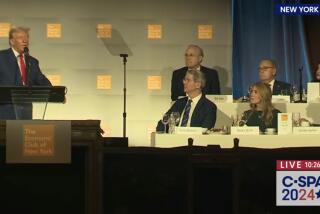‘Star Wars’ Goal Cut, Quayle Says : Defense Role to Be Limited; Calls Reagan’s Plan ‘Political Jargon’
WASHINGTON — Conceding that former President Ronald Reagan’s “Star Wars” plan was only “political jargon,” Vice President Dan Quayle said Wednesday that the missile defense concept has been revised into a smaller and cheaper program without the pretense of being able to deflect a massive Soviet first strike.
Quayle said the Bush Administration’s revised plan is intended only to cope with a limited Soviet attack or with the sort of missile strike that could be mounted by a Third World nation that might acquire a small arsenal of relatively unsophisticated rockets.
“We have redefined (Star Wars and) put it into missions, requirements, doctrine and strategy much differently than we did in the early 1980s,” Quayle said during a lunch with editors and reporters of The Times Washington Bureau.
Once Staunch Supporter
The vice president was once a staunch supporter of the proposal, officially known as the Strategic Defense Initiative, which Reagan said would end the danger of nuclear war by making atomic weapons “impotent.” But Quayle admitted Wednesday that the plan was never realistic.
He said Reagan “talked about this impenetrable shield that was going to be completely leak proof. . . . I believe that, in the semantics of let’s say political jargon, that that was acceptable. But it clearly was stretching the capability of a strategic defense system.”
Instead of the system that Reagan said could protect U.S. cities, Quayle said the Bush Administration is supporting a plan called “Brilliant Pebbles” which would release swarms of mini-missiles to track incoming rockets. He declined to estimate the cost of the revised program, but said it would cost far less than the Reagan Administration’s proposal.
The purpose of the plan, which is still in the research stage, is to thin out a flight of incoming missiles, but it makes no claim of being able to get them all. As a defense system for the U.S. retaliatory missile force, the system might be effective. But supporters of the plan admit it would be of almost no use in defending a city because even a single warhead could do incredible damage.
Bush Administration officials have expressed growing skepticism about the original “Star Wars” concept in recent months. But Quayle, as the highest-ranking of ficial to raise doubts about the plan, seemed to finish it off.
Quayle said the Bush proposal could not turn back an “all out, bolt out of the blue attack” by the Soviet Union. But he said it could be effective against a limited Soviet attack and might protect the nation from accidental missile launches or from attacks by other nations that recently have acquired missile technology.
He implied that the Administration’s more modest objectives might go a long way toward removing a major obstacle to a U.S.-Soviet agreement to reduce strategic offensive weapons. In the past, Moscow has insisted on stringent limits on the U.S. missile defense program as part of any strategic arms agreement.
But Quayle made it clear that he continues to consider Moscow to be a dangerous adversary, despite Soviet President Mikhail S. Gorbachev’s relaxation of central control over the nations of Eastern Europe and the constituent republics that make up the Soviet Union.
He said the West has begun exploring how to “manage the decline of the Soviet empire.” This planning, he indicated, includes contingency plans for dealing with a Soviet crackdown on reform policies in Poland or elsewhere.
“Clearly there have been discussions much more along the lines of ‘OK, if you (the Soviet Union) are going to open up and then there would be a clamp down . . . ,’ ” he said without finishing the sentence.
‘Heartened’ by Poland
“I think we have to get away from the wild euphoria that somehow this transition and change is going to come in the real near term,” he said. “We are very heartened by what’s happened in Poland. Poland has made tremendous progress. We’re heartened by what is beginning to happen in Hungary. But we’re also realists and look at statements that are coming out toward the Baltic states. . . . Let us remind ourselves that we’re still dealing with a totalitarian government and there are going to be bumps along the transition.”
Quayle responded to questions, most of them focused on foreign policy, for more than an hour without referring to notes or other references. Although he showed brief flashes of the self-deprecating humor that he often uses to defuse criticism, the vice president appeared confident throughout. He dismissed opinion polls that indicate the public is skeptical of his ability to assume the presidency.
“I do not worry about polls,” Quayle said. “I’m not there to look at my polling numbers. I’m there to look at the President’s polling numbers and see how the President is doing. This President is doing quite well in terms of the American public. I’m part of the team.”
On a domestic topic, Quayle said Bush hopes to be able to sign a child-care bill this year. But he said the President would not hesitate to veto a Democratic-backed bill that he considers too costly.
Bush ‘Firmly Committed’
“This President has submitted a child-care proposal,” Quayle said. “He’s firmly committed to his proposal.
“I would say a good precedent is the minimum wage proposal,” he added. “The President said this is unacceptable as it stands. The Congress went ahead for, I believe, basically political reasons and tried to put the President in a corner. He vetoed it. As a result, we don’t have a minimum wage bill. I don’t think they want to do the same thing on child care, but that will be their decision.”
Bush has proposed a child tax credit for poor families, assuming that the recipients will use the money for child care and that they will be able to find the services they need. The Democrats are backing a bill that would provide states with money not only to offset poor families’ child-care payments but that would expand and enhance child-care facilities.
More to Read
Get the L.A. Times Politics newsletter
Deeply reported insights into legislation, politics and policy from Sacramento, Washington and beyond. In your inbox three times per week.
You may occasionally receive promotional content from the Los Angeles Times.










